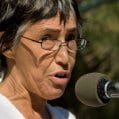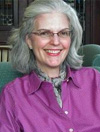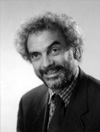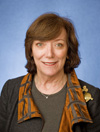Psychologists Speak Out on Torture
In spring 2010, we interviewed the following psychologists who have actively questioned the participation of psychologists in the abusive interrogations of detainees at Guantánamo Bay and U.S. prisons overseas. They offer their expert opinions and perspectives on the role psychologists play in these interrogations.

Jean Maria Arrigo, Ph.D., has studied ethics of military intelligence and weapons development on human subjects for a decade as an independent scholar. Dr. Arrigo endeavors to promote intelligence ethics as a field of study and to support moral voices within the national intelligence system. She established the Ethics of Intelligence and Weapons Development Oral History Collection (2004) at Bancroft Library, UC Berkeley, and the Intelligence Ethics Collection (2005) at the Hoover Institution on War, Revolution, and Peace, Stanford University, to gather oral histories and personal papers from concerned intelligence professionals. She authored “Utilitarian Argument against Torture Interrogation of Terrorists” and co-organized the November 2006 Seminar for Psychologists and Interrogators on Rethinking the Psychology of Torture, at Georgetown University. She was a participant on the APA Presidential Task Force on Psychological Ethics and National Security (“PENS Task Force”), and later spoke out against it.

Trudy Bond, Ph.D., earned her doctorate in counseling psychology from Oklahoma State University at age 26 and moved to Toledo, Ohio where she became licensed to practice psychology in 1980. As an independent psychologist, Dr. Bond has filed complaints with state licensing boards and the APA regarding individual psychologists implicated in the torture and abuse of detainees at Guantánamo.

Ruth Fallenbaum, Ph.D., is a psychologist in private practice in Berkeley, California. She has worked for eleven years with Survivors International, providing mental health services to refugees and victims of torture. Dr. Fallenbaum is an adjunct faculty member at The Wright Institute, Berkeley, and is a past board member of Section IX (Psychoanalysts for Social Responsibility) of Division 39 of the American Psychological Association (APA). Dr. Fallenbaum is also a member of the Steering Committee of Psychologists for an Ethical APA and co-authored a referendum, passed in 2008, which bans APA member psychologists from working at U.S. detention facilities operating outside of or in violation of the U.S. Constitution or international law.

David Gangsei, Ph.D., received his doctorate in clinical psychology from Teachers College, Columbia University. He is licensed as a psychologist in California. Since 1985, he has specialized in providing psychological services to refugees, asylum seekers, and torture survivors. For eight years he served as Clinical Director of Survivors of Torture, International in San Diego where he oversaw the development and operation of a program serving health, mental health, case management, and asylum support services for torture survivors and their families. He is now a consultant developing programs and training for organizations serving trauma victims and torture survivors. Dr. Gangsei is an expert on forensic documentation of the psychological effects of torture, and on recognition and management of vicarious trauma for professionals and support personnel working with survivors of human rights abuses. He has conducted lectures, training, program evaluation, and forensic documentation in the United States, Europe, Latin America and Africa. He is a contributing author to the Physicians for Human Rights publication “Examining Asylum Seekers: A Health Professional’s Guide to Medical and Psychological Evaluations of Torture.”

Rosa E. García-Peltoniemi, Ph.D., L.P., is a Senior Consulting Clinician at the Center for Victims of Torture in Minnesota, and has worked there since 1987. Her clinical and research background is in cross-cultural assessment and intervention with survivors of political trauma. She has lectured extensively on refugee mental health topics and has served as a consultant for the National Institute of Mental Health’s Refugee Program. She has also served on the Committee on Scientific Freedom and Responsibility of the American Association for the Advancement of Science. She is a member of the American Psychological Association and a charter member of Division 56, Trauma Psychology. Dr. Garcia-Peltoniemi obtained a Ph.D. in clinical psychology from the University of Minnesota and is licensed by the Minnesota Board of Psychology as a Licensed Psychologist. Dr. Garcia-Peltoniemi served as the Director of Client Services at the Center from 1991 until September 2006, when she was named Senior Consulting Clinician.

Uwe Jacobs, Ph.D., recipient of the 2009 Community Health Leaders Award from the Robert Wood Johnson Foundation. Dr. Jacobs has been working with Survivors International for the past 15 years, has provided services for hundreds of survivors of torture from many different countries, and has developed and implemented a variety of programs for survivors. He is both a clinical neuropsychologist and a psychotherapist. He is an expert on the psychological and neuropsychological assessment of asylum seekers and has written and published guidelines on this topic. Dr. Jacobs drafted the chapters on the psychological and neuropsychological sequelae of torture for the currently existing international guidelines for the examination of torture published by the UN High Commissioner (Istanbul Protocol) and for the handbook on assessment of asylum seekers by Physicians for Human Rights.

Judy B. Okawa, Ph.D., is a clinical psychologist and founder of the Center for Traumatic Stress Studies in Washington, D.C. Dr. Okawa developed the first comprehensive treatment program for survivors of politically motivated torture and human trafficking in Washington, D.C. She is nationally recognized for her expertise in working with torture survivors and has trained many attorneys and medical and mental health professionals. She has testified a number of times before congressional subcommittees and has received a Human Rights Award for her work. Dr. Okawa has written on the cross-cultural assessment of refugees and asylum seekers and is currently collaborating on a book written by torture survivors on working effectively with survivors of torture.

Brad Olson, Ph.D., is a community, social, and personality psychologist. He is research faculty at Northwestern University in the Foley Center for the Study of Lives and the School of Education and Social Policy, and will begin as a professor in a community psychology Ph.D. program at National-Louis University in Chicago. His research areas include community action, public policy, human rights, nonviolence, and the narrative study of lives. He is the past chair of the Divisions for Social Justice (DSJ), a collaborative of twelve divisions within the American Psychological Association, working on social justice issues within psychology.

Frank Summers, Ph.D., ABPP, is a supervising and training analyst at the Chicago Institute for Psychoanalysis, an associate professor at Northwestern University Medical School, and a faculty member of four other psychoanalytic institutes. He has won several local and national awards including The Hans Strupp Award for Contributions to Psychoanalysis, and The Distinguished Educator Award of the International Forum of Psychoanalytic Education. A member of the editorial board of Psychoanalytic Psychology, he is author of numerous scholarly journal articles and papers presented at national conferences and has given many daylong conferences and workshops. Dr. Summers is currently past president of Section IX (Psychoanalysis and Social Responsibility). A member of the steering committee of APA Dues, he has worked to change the policy of the American Psychological Association to: 1) prohibit psychologists from participating in interrogations in detention centers; and 2) eliminate the standard of the ethics code that allowed “following orders” to be used a defense against ethical violations. He is author of three books, all published by The Analytic Press: Object Relations Theories and Psychopathology: A Comprehensive Text; Transcending the Self; and Self Creation: Psychoanalytic Therapy and the Art of the Possible. Dr. Summers maintains a private practice of psychoanalysis and psychoanalytic psychotherapy in Chicago, Illinois.

Nina K. Thomas, Ph.D., ABPP, is a psychologist-psychoanalyst in private practice in Morristown, NJ and in New York City. She graduated from Columbia University in 1980 with a degree in Clinical Psychology and from the NYU Postdoctoral program in Psychotherapy and Psychoanalysis in 1987 with a certificate in psychoanalysis. She is Adjunct Clinical Associate Professor at the NYU Postdoctoral Program in Psychotherapy and Psychoanalysis where she is also Chair of the Specialization in Trauma and Disaster Studies as well as Co-Chair of the Relational Track. With over twenty years of experience in working with trauma, Dr. Thomas teaches and presents widely both nationally and internationally on issues relating to trauma of ethnic violence, genocide, war and state sponsored repression. She was a member of the American Psychological Association’s Psychology, Ethics and National Security Task Force (PENS).

Michael Wessells, Ph.D., is Professor of Clinical Population and Family Health at Columbia University in the Program on Forced Migration and Health; and Professor Emeritus of Psychology at Randolph-Macon College. He has served as president of the Division of Peace Psychology of the American Psychological Association, president of Psychologists for Social Responsibility, and co-chair of the InterAction Protection Working Group. Currently, he is co-focal point on mental health and psychosocial support for the revision of the Sphere Project humanitarian standards. He has conducted extensive research on the holistic impacts of war and political violence on children, and he is author of Child soldiers: From violence to protection (Harvard University Press, 2006). He regularly advises UN agencies, governments, and donors on issues of psychosocial support. Throughout Africa and Asia he helps to develop community-based, culturally grounded programs that assist people affected by armed conflict. Dr. Wessells was initially a member of the APA Presidential Task Force on Psychological Ethics and National Security, but later withdrew his participation.